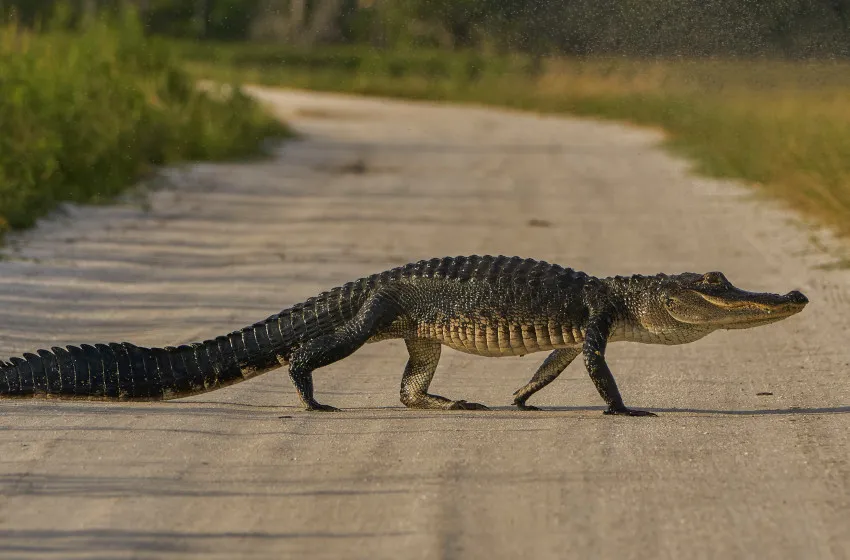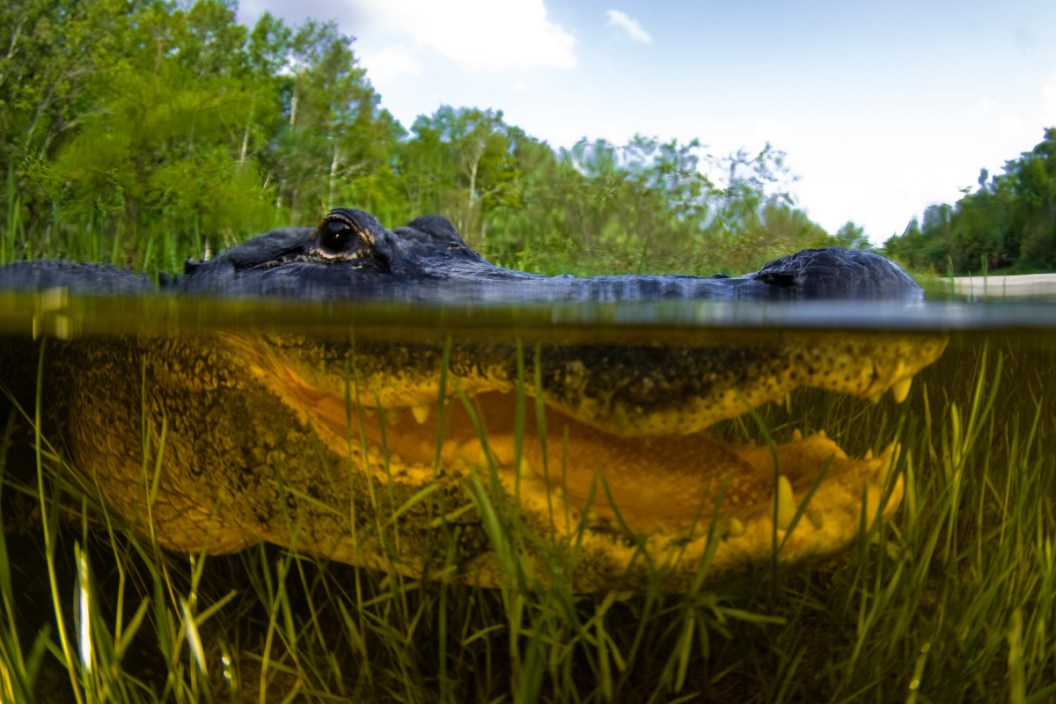For filing away under the "Hope you don't need it" category, this is how to survive an alligator attack.
One of the more iconic bounce-back conservation stories in North America is that of the American alligator. It's easy to forget that in 1973, these large, apex predators were once on the endangered species list.
Thanks to protections, the population rebounded in only 14 years, and there are now an estimated 1.3 million of these animals in Florida alone. The range of the animals extends into the Carolinas, Georgia, Alabama, Louisiana, Mississippi, and even parts of Texas.
While they're usually wary of humans, alligator encounters have been on the rise in recent years. These animals don't normally consider humans prey items, but they can be opportunistic. Case in point is the tragic case of 7-year-old Lane Graves, who was killed by one at Walt Disney World while playing by the water in 2016.
The good news is there have been less than 40 fatal recorded alligator attacks in the United States since the 1970s. Your odds of being killed by a gator are astronomically low. However, because the big reptiles frequently wander onto golf courses, into storm drains, and even into swimming pools, it's worth knowing what to do in case an unexpected alligator encounter.
Here's how to avoid these encounters, and what to do if you find an attack unavoidable.
How to Avoid an Alligator Attack in the First Place
Your odds of being attacked by an unprovoked alligator are extremely low. However, authorities with the Florida Fish and Wildlife Conservation Commission stress that the best way to survive an attack is to avoid it in the first place. Fortunately, it's not that hard to do if you follow their simple tips.
Firstly, the FWC recommends never swimming at night, dusk, or dawn, which happen to be the times when alligators are most actively feeding.
Secondly, they recommend only swimming in areas specifically marked for it. They also suggest keeping small children and pets a safe distance from the water's edge. The FWC recommends a reliable leash to keep animals from wandering near the water themselves. Alligators can be drawn to bodies of water where they wouldn't usually be found if they find food there.
It should go without saying, but alligators tend to lose their fear of humans if they are fed, which is why wildlife experts strongly recommend against it. It immediately makes people and pets in the area more vulnerable to gator attacks.
Finally, most experts simply recommend keeping alert anytime you're near freshwater in alligator country. Sometimes these reptiles wander into some unexpected and small bodies of water. More than one person has been surprised by a run in with an alligator that was hiding out somewhere they didn't expect.
How Do You Survive an Alligator That's Chasing You?

Getty Images: Bkamprath
Fortunately, alligator attacks on land are extremely rare. Of course, despite the best planning and precautions, sometimes alligators surprise humans. Many encounters have happened when a person has unknowingly wandered too close to a mate-seeking male or nest of alligator eggs during the mating and nesting seasons. Sometimes these large nests are hidden extremely well in tall marsh grasses and aren't visible until you're right on top of them. If a female catches you near a nest, odds are she'll chase you. It's not so much a feeding behavior as it is a defensive one.
There's some bad advice floating around out there recommending that you run in a zigzag pattern to escape an alligator on land. However, as wildlife expert Rog Magill told ABC News after the 2016 attack on Lane Graves, that's not a good idea.
"When you run back and forth, you are in fact exposing yourself to attack for a longer period of time than if you just ran in a straight direction and got out of there," Magill told the news station. "Once you're no longer a threat, it has no interest in you."
That makes sense. Alligators have surprised more than one person with their speed. However, gators are a bit like sprinters; their speed is limited to short distances. If you can quickly put space between yourself and the reptile, odds are it's going to give up and return to the water quickly.
If the straight line method doesn't work, and an alligator latches onto you, Magill recommends fighting back. Most alligators that bite will give up quickly if you fight back. Magill and other experts recommend trying to gouge the alligator in the eyes. If you cannot get to the eyes, try to punch or kick them in their sensitive snout. Sometimes that's enough to get them to loosen their grip.
Whatever you do, don't try to pry the animal's jaws open, because you're simply not going to be able to do it. Alligators have thousands of pounds of bite force thanks to the strong muscles in their jaw. You're better off waiting for an opening when the gator loosens its grip. Once it does, make a break for it.
How to Survive an Alligator Attack in Water
In the unlikely event that an alligator grabs you in the water, there are two dangers, one from the alligator itself and the other from drowning. In most cases, the alligator will start spinning in what is known as a "death roll." It's rather gruesome, but the point of this behavior is to rip chunks of flesh off their victim for consumption.
However, if the animal is persisting, and you know you're going to end up in a death roll, that's when things become more dire. Try to roll with the animal. That's your best chance for mitigating the damage to your limbs. There's also a possibility at the end of the roll that the animal will need to stop and rest, or even open its mouth to get a better grip. That's when you should either continue fighting back or take the opportunity to escape.
In a best-case scenario, a human can dissuade the alligator from attacking by fighting back and proving themselves as a difficult prey to finish off. Most alligators will quickly realize a human isn't their normal prey item, and give up their fight. Experts recommend you should never play dead with an alligator. In fact, that may hasten your demise if you try.
Of course, the ideal scenario is to avoid being attacked in the first place. By using a little common sense and keeping your wits about you, you can easily stay safe during your outdoor adventures and activities in alligator country.
For more outdoor content from Travis Smola, be sure to follow him on Twitter and Instagram For original videos, check out his Geocaching and Outdoors with Travis YouTube channels.




